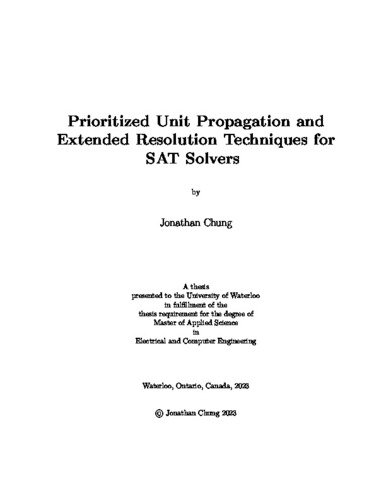| dc.description.abstract | NP-complete problems like the Boolean Satisfiability (SAT) Problem are ubiquitous in computer science, mathematics, and engineering. Consequently, researchers have developed algorithms such as Conflict-Driven Clause-Learning (CDCL) SAT solvers, aimed at determining the satisfiability of Boolean formulas. As the result of decades of research in the development of CDCL SAT solvers, these algorithms solve real-life SAT instances surprisingly quickly, performing well despite the fact that the SAT problem is believed to be intractable in general. While modern CDCL SAT solvers are efficient for many real-world applications, there is continual demand for ever more powerful heuristics for newer applications. This demand in turn provides the impetus for research in solver heuristics. In this thesis, we address this need by proposing a new heuristic for Boolean Constraint Propagation (BCP), a key component of CDCL SAT solvers, and a novel, extensible, architectural design of an Extended Resolution (ER) SAT solver, a class of solvers that is more powerful than CDCL solvers.
The impressive performance of CDCL SAT solvers on real-life Boolean instances is, in part, made possible by a combination of logical reasoning rules and heuristics integrated into different components of the solvers. Given that such combinations are currently the most successful paradigm in SAT solving, it is natural to ask how such combinations can be made even more efficient. We observe that there are two different approaches that can be taken to improve SAT solvers: one approach is to modify individual components within the SAT solving algorithm, and the other approach is to change the overall structure of the algorithm. We explore both approaches in this thesis.
Following the first approach, we examine a critical component of CDCL: the Boolean Constraint Propagation (BCP) algorithm, which systematically finds implications of variable assignments made by the solver. In most implementations of BCP, variable values are propagated greedily -- the values of implied variables are set immediately after they are detected. This observation suggests that there could be a smarter way to perform BCP by prioritizing part of the search space rather than propagating implied variables immediately after they are encountered. In this work, we develop an algorithm which allows BCP to prioritize propagations, choose a heuristic priority ordering of the variables, and demonstrate a class of instances where our prioritized BCP algorithm, combined with this heuristic ordering, is able to outperform the traditional BCP algorithm.
For the second approach, we note that solvers are fundamentally mathematical proof systems, and that CDCL produces proofs in the Resolution proof system, which is theoretically weaker than Extended Resolution (ER), a related proof system. Hence, it is natural to try integrating ER techniques into the CDCL algorithm, thus rendering it more powerful. However, it is well known that automating the ER proof system deterministically can be very challenging. Instead of proposing a single set of techniques to implement the ER proof system, we develop a programmatic framework (and an associated set of techniques) that enables one to upgrade CDCL solvers into an ER-based SAT solver. More precisely, we add three new major programmatic components: extension variable addition, extension variable substitution, and extension variable deletion. These components can be easily extended to test various ER ideas and heuristics. One of our considered heuristics is shown to be generally competitive with the baseline CDCL solver while improving upon the baseline for a specific class of cryptographic instances. | en |

